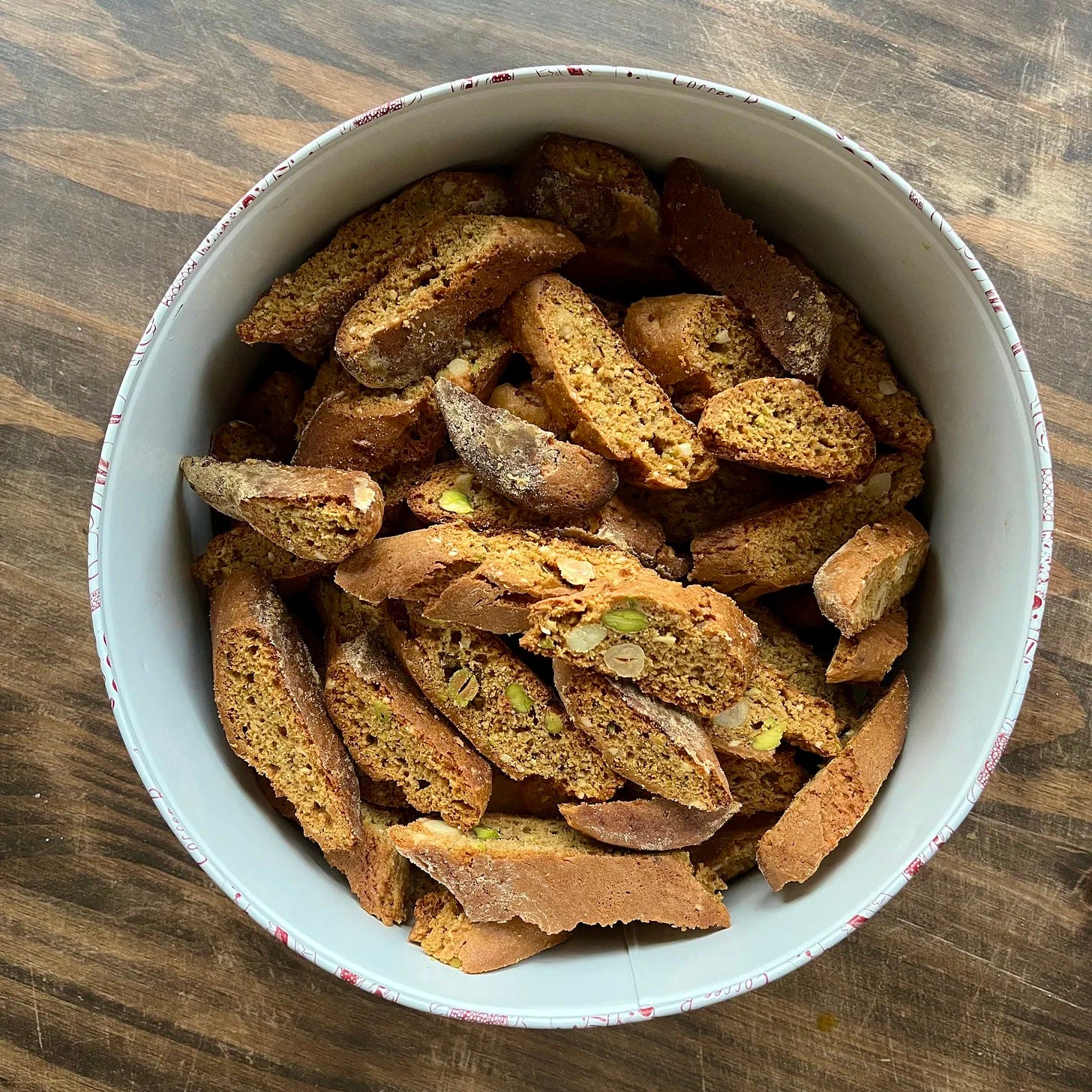Class of 2024: The Gift of Time
recipes for a pasta bake (incl. a veggie alternative) and winter solstice cantuccini
I’ve been thinking about circularity. Not only because I’ve been faithful to regular routes for my walks and runs, but in relation to the soil. How still woodlands are in December, secretive and pungent, not unpleasant but demanding, leaves laying thick on the ground. How wind gusts sound, whipping through the naked trees. The river roars, overflowing. There are noticeable oddities too, like the tree that bloomed in yellow out of winter at the last roundabout before the park. Days are short and the light rare, yet so generous when it shows up. The more I walk the same circular, the more I see the details that cast it — there are greens growing and earthworms poking at the surface. The autumnal leaves are fading, soaked by Earth. It may be still, but it isn’t senseless; dormant but not passive; it withdraws to return. And, if we care for the soil, it cares for us back. To think about circularity isn’t new; I’m not original; it’s been a stormy year, so I’ve had to learn about water circles, from evaporation to precipitation—and back.



I’ve become a superstitious cook, throwing ‘the herb of time’ in pretty much everything I eat; cooked the same meals on repeat, until they gained significance, wintering. Dill and peas; dill and squash; dill and tinned mackerel; dill and butter beans; dill and smoked haddock; dill and lentils.
I’ve flicked through books and thought back to some of my favourite quotes about time, looking up for clues and searching for a soulful glance, something else than a twenty-four-hour count, a different earmark than twelve, gone months.
‘Time and I have quarrelled. All hours are midnight now. I had a clock and a watch, but I destroyed them both. I could not bear the way they mocked me.’ – Susanna Clarke, Jonathan Strange & Mr Norrell
‘An infinity of passion can be contained in one minute, like a crowd in a small space.’ – Gustave Flaubert, Madame Bovary
‘My past is everything I failed to be.’ – Fernando Pessoa, The Book of Disquiet
‘Time moves slowly, but passes quickly.’ – Alice Walker, The Colour Purple
I’ve scrolled through my phone’s album, incapable of deleting any photos, not even the screenshots of missed deadlines for various said-opportunities, and I catalogued my film photos over and again, by themes then locations then season, then in a jam.
‘All photographs are memento mori. To take a photograph is to participate in another person’s (or thing’s) mortality, vulnerability, mutability. Precisely by slicing out this moment and freezing it, all photographs testify to time’s relentless melt.’ – Susan Sontag, On Photography
I poured thoughts and thoughts into the year’s end, and I read read read, yet there is no hidden depth to it. It is an ordinary story of time passing – to breathe through the hiccups. As Joan Didion wrote in The Year of Magical Thinking: ‘Life changes in the instant. The ordinary instant.’
As 2024 draws to a close, we are flooded with invitations to reflect on past events. Our achievements, our disappointments, our best memories and the best and worst things we read and watched; we are sent discount codes and gift guides, so we can gloss our lives with objects and fill our diaries with plans. I relate to these measures of time; I, too, worry about how well I have performed this year, even more about my future. I click the bait and buy the item. In a fury, then eased, I’ve thought back to Thomas De Quincey’s sentence, ‘the brain is haunted as if by some jealousy of ghostly beings moving amongst us’, as analysed by Brian Dillon in Suppose a Sentence:
‘I have been wondering for years what exactly this phrase, “some jealousy of ghostly beings”, could mean, but have only now, as I’m writing, thought to solve the mystery by just looking the thing up. Perhaps I had wrestled enough with the serpentine grammar of the sentence; maybe I wanted to keep in mind, and in the mind of the sentence, an essential ambiguity. I think I liked the idea that “jealousy” might in fact be the collective noun, De Quincey’s coinage or not, for a group of ghosts. Odd behaviour, to want the sentence to be more eccentric, or even make less sense, than is already peculiarly the case.’
About always wanting more.
This is the last newsletter of the year and, in the end, I’m most grateful for the gift of time this space and format have enabled me to seek. That is, the opportunity to exercise a certain empathy towards my time and the time of others, a circularity that has introduced plural ways of knowing and allowed me to be a coincidence dweller. And I thank you for joining me: let us be Flaubert’s ‘infinity passion’, a ‘small crowd’ who watch out and over.
See you in the kitchen, in 2025. In the meantime, I wish for us to seize the gift of time. Call a friend, sit and give them your full attention; read a cookbook like a novel; spend an afternoon, an evening, thirty minutes, doing something you’re bad at but love doing; offer to look after a friend’s child, so they can have a few hours of their own too; batch cook for a neighbour who isn’t well, for someone who hates cooking; listen to an album in full. By gifted time, I mean attentive time, given and giving and spent fully, which can also be quiet and purposeless indeed.
For now, if you’d like to pass some time by cooking something for someone, or yourself, I have a recipe for a tinned crab, smoked salmon and oat cream pasta bake. This one is dairy free and you can replace the fish with mushrooms to make it veggie*.
500g conchiglie pasta (or shape of your choice)
100g smoked salmon, roughly chopped
100g tinned crab meat
1 bunch of rainbow chard, chopped
1 handful of dill, chopped
1 handful of parsley, chopped
1 (smallish) leek, chopped
1 handful of (frozen) peas
400ml of oat cream
In a pot, bring some water to the boil. Salt. Cook the pasta. Drain (keep one ladle of the cooking water) and set aside.
In the meantime, in a pan and over a medium heat, fry the leek, chard stalks and parsley with a little bit of olive oil. Once the vegetables are translucent, throw a ladle of cooking water from the pasta and add the chard leaves and peas. (*If you’re opting for the veggie option, you’ll need to add and cook the mushrooms before stirring in the water and chard leaves.) Cook for 8-10 minutes. Add the cream and mix well. Turn off the heat, leave aside.
Preheat the oven to 180C fan. Prepare a rectangular oven dish. Combine the creamy vegetables with the dill, the crab and the smoked salmon. Pour into the dish, spread, add the pasta, mix. Bake for 15-20 minutes, or until the mixture bubbles and the pasta are crispy on top.
Dig in. Warmly,
Margaux
PS. Those of you who have been reading The Onion Papers for over a year will know that, comes the winter solstice, we make a large batch of cantuccini with my partner, Ludo. As the saying goes in our household, ‘it’s been a 77 cantuccini kind of day’, so here we potter around the kitchen:
(the recipe below will make approx. 70 biscuits!*)
2 egg whites and 3 whole eggs
200g brown sugar
500g flour (00)
3 tbsp baking powder
200ml sunflower oil
2 tbsp vanilla essence
2 tsp sesame seeds
100g ground almonds
250g pistachio, some left whole and others roughly chopped
50g blanched almonds, some left whole and others roughly chopped
50g hazelnuts, some left whole and others roughly chopped
(Recipe note: we’ve played with the nuts and spices we use over the years. It’s a malleable recipe, so stick to the ratios and the method to dry the biscuits more than the components.)
In a large bowl, beat the egg whites and the whole eggs. Add the sugar and mix. Add the vanilla essence, sunflower oil and sesame seeds; mix well. Mixing continuously with a wooden spoon, start adding the flour and baking powder slowly. Once you’ve a homogeneous batter, incorporate the nuts, mix well. Cover with a kitchen towel and leave the preparation to rest for 1 to 2 hours at room temperature.
Preheat the oven to 200C and prepare a baking tray with baking paper. Spread some flour over a working surface and make long logs from the biscuit preparation with your hands. You should be able to make 5 or 6 with the above measurements. Place the logs on the prepared baking tray and bake them for 15 to 20 minutes (until golden). Remove the logs from the oven and lower the temperature to 140C. In the meantime, once the logs are cool enough to handle, slice the biscuits. Start from the top end, cutting diagonally, and repeat by making biscuits of approx. 1cm width. Lay the biscuits flat on a wire rack and return them inside the oven to dry. It should take 15 minutes or so. I like to keep the oven door open slightly during that process.
*Cantuccini last for weeks if they’re stored in a sealed container.
Undoing the Reader’s Journal
If you’ve gone through the French education system, you may associate being taught and shamed as reciprocal. (This is my observation, and I don’t endorse the method; I wouldn’t know if this is still the case as I left France years ago.) The point is, when I was in collège, so the mandatory school years between 11 years old and the age of 15, we had to u…
Thank you for reading. I’m Margaux, a writer and cook, and this is my hybrid newsletter. If you enjoy The Onion Papers, you can subscribe and come back for seconds (Thursdays are for long reads and Mondays for annotated recipes, both come out every other weeks) <3









